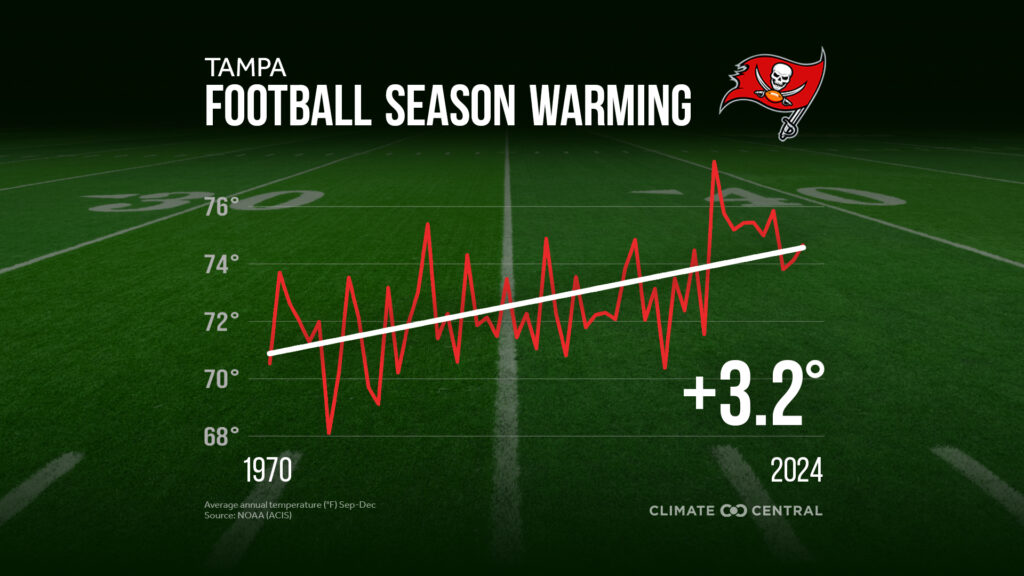By Morgann Rhule, The Invading Sea
As the Super Bowl heads to New Orleans this weekend, the only thing rising faster than the stakes is the temperature.
Since 1970, the 30 cities with NFL teams have seen temperatures increase an average of 2.8 degrees Fahrenheit during the league’s regular season from September to December, according to a recent analysis by Climate Central.
The average temperature during football season has risen 3.8 degrees over that period at the site of this Sunday’s Super Bowl in New Orleans, although professional football is played there in a domed stadium. All NFL cities except Los Angeles have warmed at least 1 degree since 1970, the analysis found.
“One of the things that’s really interesting about the study is how much the temperature has risen on average in such a short period of time,” said Peter Girard, vice president of communications for Climate Central, a nonprofit organization that analyzes and reports on climate science.

With three NFL cities on the map, Florida is particularly vulnerable to the impacts of rising temperatures. The home communities of the Jacksonville Jaguars, the Miami Dolphins and the Super Bowl LV-winning Tampa Bay Buccaneers have all faced increasing heat.
Miami experienced a 2.6-degree rise since 1970, Jacksonville saw a 1.5-degree increase and Tampa faced one of the highest increases, with temperatures rising by 3.2 degrees in that period.
The analysis shows that NFL cities are not only warming but also experiencing a rise in risky heat extremes. These increases present a mounting challenge to player safety and performance.
Football is already a physically demanding sport, and the rising temperatures mean more games will be played under conditions that strain players’ endurance and health. However, the impact extends beyond the field, affecting the fan experience.
Often packed with thousands of spectators, stadiums can become sweltering heat zones. Extreme heat “correlates with reports of heat sickness, emergency room visits and even deaths,” Girard said.
He said it’s not just cooler months that see these dramatic temperature shifts.
“We’re using a period for the NFL study that bridges only two seasons, fall into winter,” Girard said. “(But) Florida is seeing higher heat in all four seasons.”
The rise in temperature affecting Florida’s NFL teams is just one part of a broader climate trend impacting the entire state and country. And, as Girard explained, there is a short- and long-term solution.
The short-term solution is to ensure that stadiums and cities protect people from these high temperatures. One approach is providing cooling centers and ensuring widespread access to air conditioning. Additionally, implementing heat-adaptive measures in public spaces, such as shaded areas, misting stations and reflective pavement.
“One of the responses we’d like these trends to lead to is that short-term protection for everybody,” Girard said.
Over the long term, addressing climate change means curbing greenhouse gas emissions.
“The only way to ultimately address it is to reduce carbon emissions and essentially stop contributing to this blanket of heat that is trapping warmth under the surface and creating conditions that are increasingly impossible to live with,” Girard said.
Morgann Rhule is a senior majoring in multimedia journalism at Florida Atlantic University who is reporting for The Invading Sea during the spring 2025 semester. Banner photo: An aerial view of Raymond James Stadium in Tampa in 2021, before the Tampa Bay Buccaneers played the Kansas City Chiefs there is Super Bowl LV. (iStock image).
Sign up for The Invading Sea newsletter by visiting here. To support The Invading Sea, click here to make a donation. If you are interested in submitting an opinion piece to The Invading Sea, email Editor Nathan Crabbe at ncrabbe@fau.edu.



